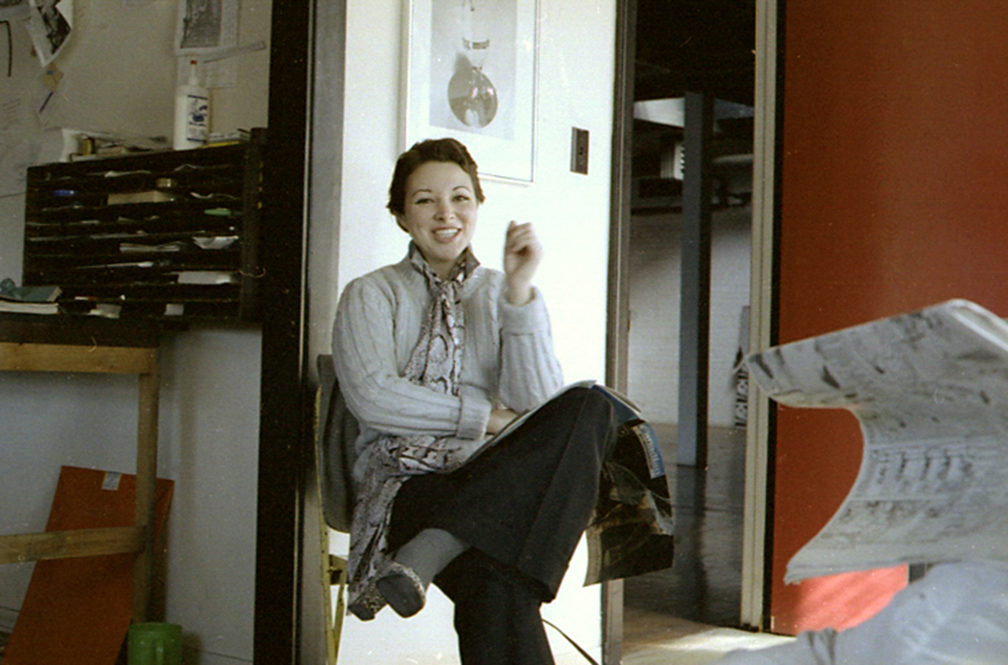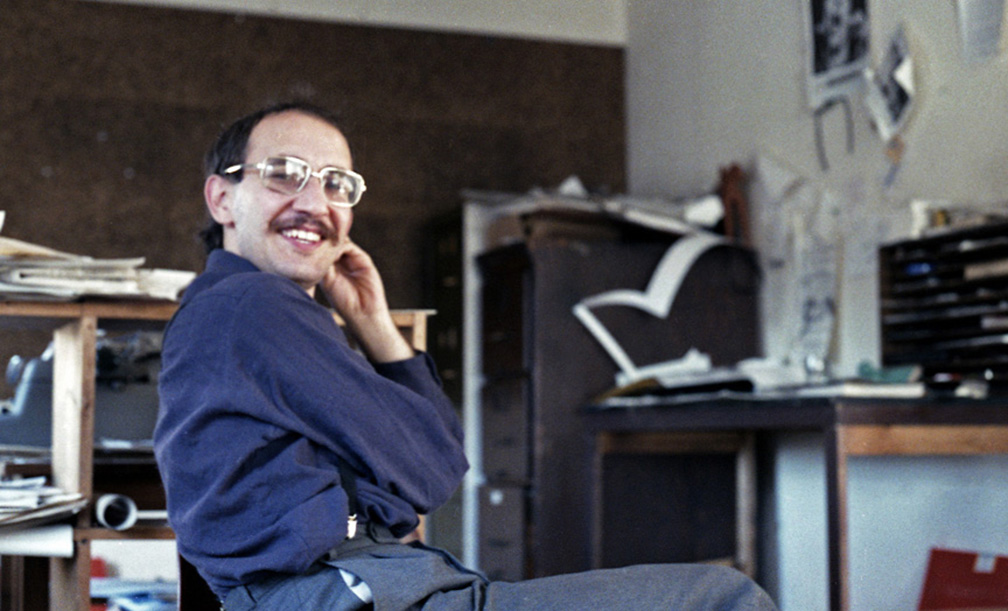Why not download this rare and lovely pdf of Diane Boadway and Amerigo Marras in conversation at the Bayfront Restaurant in Toronto on June 27, 1978. It’s an excerpt from Diane Boadway’s Confrontations. Amerigo Marras at Bayfront Restaurant
Diane Boadway and Amerigo Marras (CEAC director) in conversation at the Bayfront Restaurant, Toronto, June 27, 1978, an excerpt from Confrontations by Diane Boadway
Amerigo: In Milan we went to this place that was really incredible, it was self-operated, like the kids supported the place themselves. It was apparently closing down because of drugs. You know, the police were shutting them down. It was amazing, it was so big, cafes, restaurants and all that, exhibition space, performance space, huge place. Like for the closing night, you know, that’s where we went. A lot of people were speaking, Umberto Eco and people like that; and then there was this guy Bifo he is called, he was some sort of radical, a very well known figure in Italy. He wrote a book called, “Who Killed Mayakofsky,” in a new style of narrative, you know. You should look at it actually, stylistically it’s very interesting. But anyway, on the same night there were lots of things happening and thousands of people, literally thousands of young people were there. I just couldn’t believe how they dragged so many people in. You know, in Toronto that would never happen, by the thousands. We found the music a little bit corny, but the whole atmosphere, the whole idea of having so much infrastructure for taking care of themselves, that was amazing. And then, yeah, this guy Bifo was saying, the narrative in the book “Who Killed Mayakovsky” is something between a narrative and historical novel, like mid-page he stops and fills the rest of the page with dots: dot, dot, dot, dot., dot, dot, dot, so much for narrative. Have you ordered? He writes like you were in the past and the present, he talks about Mayakovsky being himself, or being alive amidst all these fictitious people. It’s sort of interesting, the kind of structure that he uses. But what is interesting about him is that he is very outspoken about the present situation in Italy, the younger generations, the outré left. He disagrees strongly with the New Philosophers, because he feels that they are just muddling the whole argument against Soviet Camps and thereby doing a favour to capitalism and liberalism.
Diane: Can you go over who the New Philosophers are again?
Amerigo: Oh, there are lots of them. The most known are… the most respected one is Glucksmann. The guy who came over, Bernard-Henri Levy, is actually the founder, he named the whole movement. There are other people who are marginally attached to it, like Benoit, Dolle. However the main people are Levy and Glucksmann in particular. It takes the whole point of criticism of dissidence in the East. Well, my whole criticism to that is that it there is also dissidence in the West, and it is more dramatic than has ever been reported. It goes from the aboriginal Americans, the North American Indians, to people like us.
Diane: Right, that’s a good point, I think they are very valuable people.
Amerigo: There is a magazine actually called Dissenso; which is the only one that talks about the East and the West.
Diane: These groups that you were saying were so strong, say in Italy, for example, that are dealing with radical ideas and publishing newspapers, how do you think that they survive?
Amerigo: Well you have to figure out that first of all, they have a bigger group behind them that supports a centre or a publishing activity. There are a lot of people interested in that, so somehow there is money going back. The whole milieu seems much more active in speaking out through books, radio broadcasting, television broadcasting. It’s a tradition.
Diane: They are not stopped or anything, they are allowed to survive?
Amerigo: Well, right now actually, I think that there is a lot of paranoia, a lot of problems going on, but in comparison to what we have been saying for instance, I mean, there is much more of that, in many different forms and people are saying a lot that disturbs the system. There is a magazine called Male, meaning evil, and it is a very sarcastic magazine, a nasty little magazine, you know. Then there is a magazine called Dissenso, there is another one called Rosso.
Diane: This is from Milan?
Amerigo: Oh they are all over. Some magazines have different kinds of, well a single magazine might have, yeah, I was looking at it today, it might even have four or five different headquarters.
Diane: That’s a good idea.
Amerigo: Yeah, there are magazines about practically everything. You name it, there is a magazine.
Diane: I noticed that when we were in Milan last year.
Amerigo: Well, now even more.
Diane: Than last year?
Amerigo: Yes, much more.
Diane: A definite kind of…
Amerigo: Oh yeah, an explosion. More magazines than you could ever buy.
Diane: Is that because of the terrorist activities?
Amerigo: Oh no, I wouldn’t call it terrorism. There is a difference between terrorism and guerillas, OK you could probably call it terrorism, that’s an effect of something that is happening, part of the same movement of dissent. A whole generation of young Europeans are actually rebelling against the people who have been in power for thirty years.
Diane: And that’s not necessarily terrorism, that’s more like…
Amerigo: No, I would call that guerilla, because guerilla gives a better idea of what is happening, in other words, the act of rebellion.
Diane: Are there a lot of young people and students following this?
Amerigo: Oh, thousands, millions, with different directions. Oh I met by chance, actually they met me by chance, this group from Bologna, you remember, the students, they recognized me somewhere, they said, “Oh come here,” I said “Who me?” “Yeah you.” Then they asked, “Don’t you remember?” And I remembered.
Diane: Do you think that the conditions that are happening, that are being protested against, exist here as well? The kind of bourgeois situations and corporate governments.
Amerigo: Well there are reasons here to actually rebel, but the problem is first of all that people haven’t thought about it well enough, and there isn’t any organization to pull it together, and there isn’t any tradition to do so. So probably it will take a little bit more time before something like that would actually happen. Whatever is happening now or over the last couple of years in Italy, can only be compared to another singular situation in Europe, which is the Constructivist period which saw an overflow of publications, of events, of organizations. It is happening now again in Italy and France. I couldn’t think of anything else. Even Berkeley or Paris in 1968 were not the same thing because it was not an outpouring of so much stuff, you know.
Diane: Do you think that situations here will just keep on being the same until there is a kind of radical wave opposing them? Some kind of new system devised?
Amerigo: Well, things are never really the same because we always have more or less information or different informations.
Diane: I was just wondering if you were saying that there has to be a certain system?
Amerigo: Oh probably it will take a little while. Things do not really happen over night. I think a situation that…

